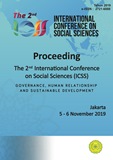POLICY OF LOCAL GOVERNMENT IN PROTECTING CULTURAL LEGAL COMMUNITY TRADITIONAL IDENTITIES AND RIGHTS BATANG HARI DISTRICT
Abstract
In this study, the author uses a qualitative approach is a research method based on the philosophy of postpositivism, used to examine the natural conditions of objects where researchers are as a key instrument to look for problems related to local government policies and then analyze the causes of these problems then find solutions and anticipate the problem reappeared. The differences in ethnicity, culture and customs of a nation is a social cultural reality of Indonesia, and this shows how the existence of primordial awareness in the life of the Indonesian nation, besides being a natural condition to be grateful and admired, must also be wary because it has a high enough conflict intensity. Culture gives shape to people's attitudes, people's mental attitudes, and people's daily life patterns. Instead, attitudes and patterns of life also give shape to culture. Culture is learned and the culture adapts and develops. Regional culture has a long history and has its own wisdom and superiority. In each of them, the culture contains elements that our founding fathers extract in the Pancasila. Customs and sociocultural values of society are one of the social capital that can be utilized in the context of implementing development. Preservation and development of customs and socio-cultural values of the community was built by prioritizing three main pillars, namely the pillar of community economic development, the preservation pillar and the pillar of the independence of the community. In the end, a local government policy is needed to protect Cultural Identities and Traditional Rights of the Community is a must. Keywords: Local Government, Cultural Identity and Traditional Rights of Customary Law Communities.References
Bungin, Burhan, 2013, Social and Economic Research Methodology, Kencana Prenada Media Group, Jakarta.
Duwi, Priyanto. 2008. Mandiri Learning SPSS, MediaKom, Yogyakarta.
I Gde Pantja Astawa and Suprin Na’a. 2008. The Dynamics of Law and Legislation in Indonesia, Alumni,Bandung.
Jimly Asshiddiqie. 2015. The Constitution of the Village Community (Charter of Responsibilities and Human Rights of Villagers), Faculty of Law, University of Indonesia.
Maria. S. W. Sumard jono. 1996. Land Policy Between Regulation and Implementation, Kompas Book Publisher, Jakarta.
Mr. B. Ter Haar Bzn and K. Ng. Soebakti Poesponoto. 1987. Principles and Structure of Customary Law (Beginselen en Stelsel van Hat Adat Recht), PT.Pradnya Paramita, Jakarta.
Muhammad Tahir Azhary. 1992. Rule of Law: A Study of Its Principles. Judging from the aspect of Islamic law, its implementation in the Medina State Period and the Present, Dissertation, Crescent Star, Jakarta.
Ni'matul Huda. 2006. Constitutional Law, Rajagrafindo, Jakarta.
Nurcholis. 2005. Theory and Practice of Government and Regional Autonomy, Grasindo, Jakarta.
Sugiyono, 2014, Understanding Qualitative Research, Alfabeta, Bandung.
Tolib Setiady. 2009. Highlights of Indonesian Customary Law, Alfabeta, Bandung.


